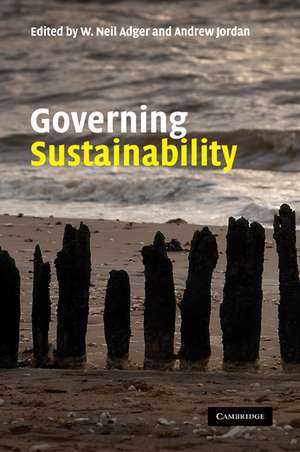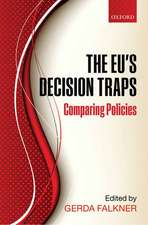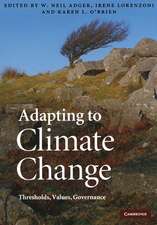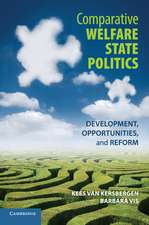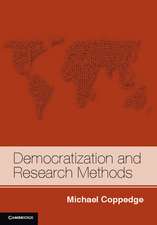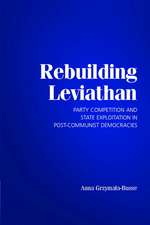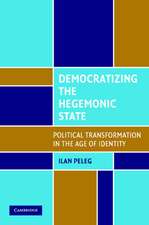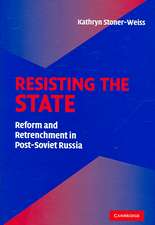Governing Sustainability
Editat de W. Neil Adger, Andrew Jordanen Limba Engleză Paperback – 4 feb 2009
| Toate formatele și edițiile | Preț | Express |
|---|---|---|
| Paperback (1) | 282.53 lei 6-8 săpt. | |
| Cambridge University Press – 4 feb 2009 | 282.53 lei 6-8 săpt. | |
| Hardback (1) | 493.67 lei 6-8 săpt. | |
| Cambridge University Press – 4 feb 2009 | 493.67 lei 6-8 săpt. |
Preț: 282.53 lei
Nou
Puncte Express: 424
Preț estimativ în valută:
54.08€ • 58.76$ • 45.46£
54.08€ • 58.76$ • 45.46£
Carte tipărită la comandă
Livrare economică 21 aprilie-05 mai
Preluare comenzi: 021 569.72.76
Specificații
ISBN-13: 9780521732437
ISBN-10: 0521732433
Pagini: 358
Ilustrații: 7 tables
Dimensiuni: 149 x 227 x 18 mm
Greutate: 0.48 kg
Editura: Cambridge University Press
Colecția Cambridge University Press
Locul publicării:Cambridge, United Kingdom
ISBN-10: 0521732433
Pagini: 358
Ilustrații: 7 tables
Dimensiuni: 149 x 227 x 18 mm
Greutate: 0.48 kg
Editura: Cambridge University Press
Colecția Cambridge University Press
Locul publicării:Cambridge, United Kingdom
Cuprins
Part I. Overview and Context: 1. Sustainable development: exploring the processes and outcomes of governance W. Neil Adger and Andrew Jordan; 2. Human development and environmental governance: a reality check Katrina Brown; Part II. Governance and Government: 3. Government and the pursuit of governance for sustainability Albert Weale; 4. How do environmental actors make governance systems more sustainable? The role of politics and ideas in policy change Philip Lowe and Katy Wilkinson; 5. Global governance for sustainable capitalism? The political economy of global environmental governance Mat Paterson; Part III. Governance and Civil Society: 6. Citizens, citizenship and governance for sustainability Andy Dobson; 7. The governance of science for sustainability Jill Jäger; 8. Practitioner evaluations of participatory processes in environmental decision-making Jacquelin Burgess and Judy Clark; Part IV. Governance and Decision Making: 9. Participation, precaution and reflexive governance for sustainable development Andy Stirling; 10. Precaution and the governance of risk Ortwin Renn; 11. Economics and the governance of sustainable development Simon Dietz and Eric Neumayer; 12. Sustainability: welfare, value and time John O'Neill; Part V. Conclusions: 13. Reflections on the pathways to sustainability Tim O'Riordan.
Recenzii
'This collection offers some hugely stimulating insights … and in the process, unashamedly puts the emphasis where it now needs to be: we now know (more or less) what we need to do to secure a sustainable world, but how the hell are we going to do it?' Jonathon Porritt CBE, Chairman of the UK Sustainable Development Commission
'This smart and erudite collection problematizes 'environmental governance' and 'sustainability'. By identifying the multiple approaches to these key terms, the authors advance our collective efforts at refining the concepts and ultimately achieving sustainability.' Peter M. Haas, University of Massachusetts
'Neil Adger and Andrew Jordan have brought together an outstanding set of authors who offer an excellent overview of governance and sustainable development. This is an important book for all scholars interested in our common future.' Elinor Ostrom, Indiana University
'Our understandings of citizenship, governance, and government have evolved with the rise of understanding in ecological complexity, the desire for sustainability, and the contradictory but parallel rise of market ideology. All will continue to change with the demise of market fundamentalism, rise of pragmatism, and renewed faith in government. Governing Sustainability deeply explores the past and helps prepare us to both design and adapt with the future.' Richard B. Norgaard, University of California, Berkeley
'This smart and erudite collection problematizes 'environmental governance' and 'sustainability'. By identifying the multiple approaches to these key terms, the authors advance our collective efforts at refining the concepts and ultimately achieving sustainability.' Peter M. Haas, University of Massachusetts
'Neil Adger and Andrew Jordan have brought together an outstanding set of authors who offer an excellent overview of governance and sustainable development. This is an important book for all scholars interested in our common future.' Elinor Ostrom, Indiana University
'Our understandings of citizenship, governance, and government have evolved with the rise of understanding in ecological complexity, the desire for sustainability, and the contradictory but parallel rise of market ideology. All will continue to change with the demise of market fundamentalism, rise of pragmatism, and renewed faith in government. Governing Sustainability deeply explores the past and helps prepare us to both design and adapt with the future.' Richard B. Norgaard, University of California, Berkeley
Descriere
Examines the inevitable social and political consequences that will arise from the move to a more sustainable world.
